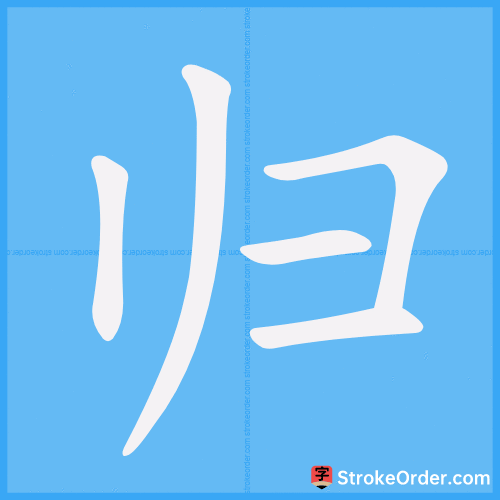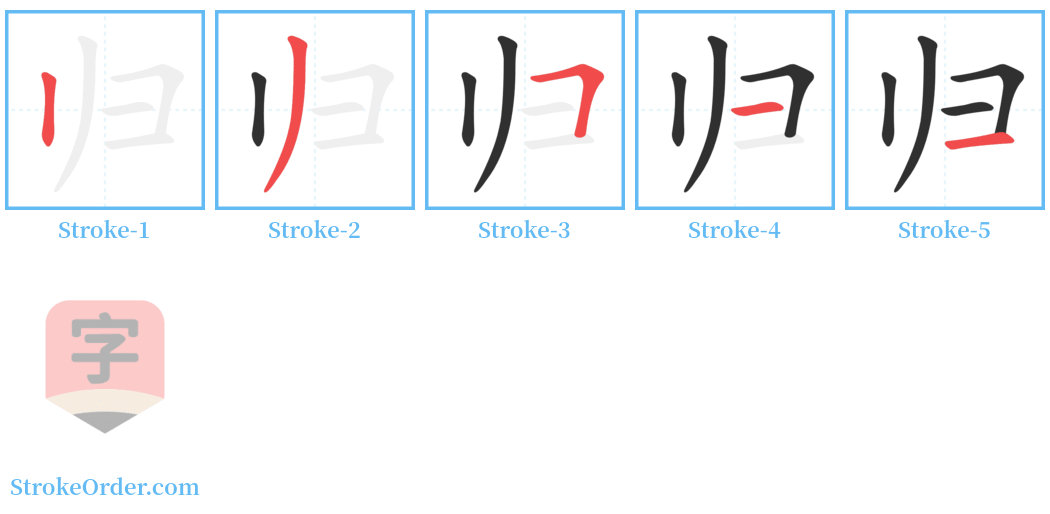归 Stroke Order
Animated Stroke Order of 归

Stroke Order Diagrams for 归

Step-by-Step Handwriting Guide for 归

Learn to Write Chinese Characters with Video Tutorials
Watch the video of writing the Chinese character "归", learn the correct stroke order (笔顺) of the character "归", and master the standard way of writing the character "归".
Free Printable Handwriting Practice with Stroke Order: 归
Printable Writing Practice Worksheet of "归" in Portrait Orientation (Tian Zi Ge)

Printable Writing Practice Worksheet of "归" in Landscape Orientation (Tian Zi Ge)

Information of 归
Pinyin
guī、 kuì
Radical
彐
Strokes
5 strokes
Usage
★★★★★
Definition
to go back / to return
归 guī
1. 返回,回到本处: go back; return.
- 例: 归国: return to the country. 归程: return journey. 归侨: returnee. 归宁: return to visit parents. 归省: return home to visit relatives.
2. 还给: return; give back to; restore.
- 例: 归还: return (something). 物归原主: items returned to their original owner.
3. 趋向,去往: tend to; towards; head to.
- 例: 归附: return allegiance. 众望所归: the choice of the public.
4. 合并,或集中于一类,或集中于一地: merge; put together; classify.
- 例: 归并: combine. 归功: attribute (credit). 归咎: assign blame.
5. 由,属于: from; belong to.
- 例: 这事归我办: this matter is for me to handle.
6. 结局: end; conclusion.
- 例: 归宿: final resting place.
7. 珠算中一位除数的除法: division on the abacus with a one-digit divisor.
- 例: 九归: division by nine.
8. 古代称女子出嫁: in ancient times, refers to a woman getting married.
- 例: 之子于归,宣其室家: "This daughter, upon marriage, will manage her family."
9. 自首: surrender; voluntarily confess.
- 例: 投案归首: turn oneself in.
歸 guī (动)
1. 同本义: (of a woman) get married.
- 【引】例: 《说文》: 归,女嫁也.
2. 返回,回来: go back; return.
- 【引】例: 《广雅》: 归,返也.
3. 归还: return something to; give back.
- 【引】例: 《孟子》: 久假而不归.
4. 辞官回家: resign and return home.
- 【引】例: 晋· 陶渊明《归园田居》: "开荒田野际,守拙归园田."
5. 死: pass away; die.
- 【引】例: 清· 袁枚《祭妹文》: "离吾乡七百里矣..."
6. 投案自首: surrender.
- 例: 归诚: submit and surrender.
7. 合并; 归依; 归属; 归到一处: put together; belong to; unify.
- 【引】例: 宋· 范仲淹《岳阳楼记》: "吾谁与归?"
8. 趋向; 归向: tend; move towards.
- 【引】例: 《资治通鉴》: "如水之归海."
9. 用在重叠动词间,表示不相干或无结果: used in compound verbs to indicate irrelevance or lack of outcome.
- 例: 玩笑归玩笑,事情可得认真去办.
10. 结算: settle accounts.
- 【引】例: 《儒林外史》: "总归不出一个清账."
11. 通“馈”: give as a gift.
- 【引】例: 《左传·闵公二年》: "归公乘马."
歸 guī (名)
珠算中称一位除数的除法: division on the abacus with a one-digit divisor.
- 例: 九归: division by nine.
歸 guī (形)
羞惭: ashamed; abashed.
- 【引】例: 《战国策·秦策》: "状有归色."
歸 kuì (动)
1. 通“馈”: present; give as a gift.
- 例: 归示: offer dignified gifts.
2. 惭愧: feel ashamed.
- 例: 归色: color of shame.
to die in such a way that sb (or sth) else also perishes / to take sb down with oneself / to end in mutual destruction
to belong to / to be affiliated to / to fall under the jurisdiction of / a place where one feels that one belongs / one's final destination (where one need look no further)
return with drums beating and banners flying / come back victorious / return home in triumph / return with flying colours / return with gongs beating and banners flying
Input Method for 归
Pinyin
gui1
Wubi
jvg
Cangjie
llsm
Zhengma
kdxb
Four Corner
27070
Unicode
U+5f52
Same Pronunciation Characters